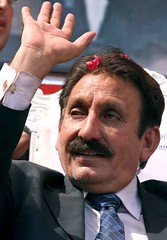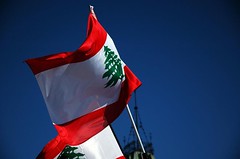 Finally, some encouraging news from Pakistan: Yousuf Raza Gilani, the Pakistani prime minister, has reinstated Chief Justice Iftikhar Muhammad Chaudhry, who former president Pervez Musharraf dismissed two years ago. Since then, protesters—composed mostly of lawyers—have mobbed Pakistan’s streets and government offices. Many hope the return of Chaudhry and other jurists will calm passions since the unrest led many to fear for the stability of the country. But what’s next for Pakistan? The country, according to many reports, is in turmoil. From random bomb attacks (such as Monday night’s explosion outside a hotel in Rawalpindi) to escalating economic woes (compounded by the surge in the price of staple good such as rice) to a host of border tensions with neighboring countries—Pakistan seems to be facing a multitude of crises. However, as these problems bubble and burst in Islamabad, the rest of the country can only watch and wonder what all this protest or (in the case of the reinstated judges) celebration means for them and their lives. As a resident of Gujranwala City in the Punjab says: “You asked me about the chief justice…I don’t know if I care. My life has not changed, justice is for people who can afford it. We look to God for our protection.”
Finally, some encouraging news from Pakistan: Yousuf Raza Gilani, the Pakistani prime minister, has reinstated Chief Justice Iftikhar Muhammad Chaudhry, who former president Pervez Musharraf dismissed two years ago. Since then, protesters—composed mostly of lawyers—have mobbed Pakistan’s streets and government offices. Many hope the return of Chaudhry and other jurists will calm passions since the unrest led many to fear for the stability of the country. But what’s next for Pakistan? The country, according to many reports, is in turmoil. From random bomb attacks (such as Monday night’s explosion outside a hotel in Rawalpindi) to escalating economic woes (compounded by the surge in the price of staple good such as rice) to a host of border tensions with neighboring countries—Pakistan seems to be facing a multitude of crises. However, as these problems bubble and burst in Islamabad, the rest of the country can only watch and wonder what all this protest or (in the case of the reinstated judges) celebration means for them and their lives. As a resident of Gujranwala City in the Punjab says: “You asked me about the chief justice…I don’t know if I care. My life has not changed, justice is for people who can afford it. We look to God for our protection.”
Russia will begin strengthening its military in 2011 in the face of increased NATO presence in Central and Eastern Europe and in the hope of deterring regional conflicts, President Dmitry Medvedev announced. Medvedev said that he aims “increase the combat readiness of [Russia’s] forces, first of all our strategic nuclear forces” and that $140 billion dollars will be used to buy arms over the next two years. In particular, the summer 2008 war with Georgia highlighted the dated equipment used by the Russian military. Medvedev also indicated in his address to military commanders that the government planned considerable investments in new military technologies.
 Five months after Lebanon and Syria agreed to normalize diplomatic relations, a Lebanese flag flies in Damascus, Syria. The first Lebanese embassy opened Monday, marking the beginning of what both countries hope will be a new era in their relationship. The two countries have struggled to co-exist since they gained independence from France in the 1940s. Amid public pressure and a UN resolution, Syria was forced to end its 30-year political and military presence in Beirut in 2005 after the assassination of former Lebanese prime minister Rafiq al-Hariri. The Syrian embassy opened in Beirut in late 2008, but an ambassador has not yet been named.
Five months after Lebanon and Syria agreed to normalize diplomatic relations, a Lebanese flag flies in Damascus, Syria. The first Lebanese embassy opened Monday, marking the beginning of what both countries hope will be a new era in their relationship. The two countries have struggled to co-exist since they gained independence from France in the 1940s. Amid public pressure and a UN resolution, Syria was forced to end its 30-year political and military presence in Beirut in 2005 after the assassination of former Lebanese prime minister Rafiq al-Hariri. The Syrian embassy opened in Beirut in late 2008, but an ambassador has not yet been named.
Sudanese President Omar al-Bashir will not face arrest when he attends an Arab League summit later this month, his Arab counterparts said. Qatar and other members of the League refuse to arrest al-Bashir on a warrant issued by the International Criminal Court for war crimes. Amr Moussa, the Secretary-General, said that arresting al-Bashir would further destabilize Sudan.